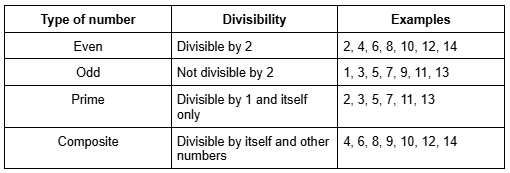Factors & Multiples - Types of numbers
Factors are the numbers which can divide the given number in such a way so that the number is completely divided with no remainder. For example, the factors of 12 are 1, 2, 3, 4, 6, and 12 .
Multiples are the numbers you get when a given number is multiplied by whole numbers. For example, the multiples of 3 are 3, 6, 9, 12, 15, and so on.
Actually, factors tear something apart into separate items, and multiples are the results of multiplication.
1. Even Numbers
What are even numbers?
Even numbers are those which are divisible by 2 without leaving a remainder.
Always multiples of 2, they can be divided into two equal groups.
Even numbers always end with 0, 2, 4, 6, or 8.
Examples of Even Numbers:
2, 4, 6, 8, 10, 12, 14, 16, 18, 20, 22, 24, 26, 28, 30.
Notice how all of these numbers can be divided evenly by 2.
For example:
12 ÷ 2 = 6
28 ÷ 2 = 14
How do you find if a number is even?
-
Check the last digit: If it is 0, 2, 4, 6, or 8 it's even.
-
Example: 54 is even because it ends in 4.
2. Odd Numbers
What are odd numbers?
Odd numbers are those that can't be divided by 2 without a remainder.
When an odd number is divided by 2, there's always a remainder of 1.
Odd numbers always have a unit digit of 1, 3, 5, 7 or 9
Examples of Odd Numbers:
1, 3, 5, 7, 9, 11, 13, 15, 17, 19, 21, 23, 25, 27, 29.
Example:
-
7 ÷ 2 = 3 remainder 1
-
19 ÷ 2 = 9 remainder 1
3. Prime Numbers
What are prime numbers?
Prime numbers are numbers that only have two factors: 1 and the number itself.
In other words, a prime number cannot be divided evenly by any number other than 1 and the number itself.
Examples of Prime Numbers:
2, 3, 5, 7, 11, 13, 17, 19, 23, 29, 31, 37.
Let's check:
-
5 is prime because its only factors are 1 and 5.
-
11 is prime because its only factors are 1 and 11.
-
Attempt to divide the number by any other number except 1 and the number.
Look at the examples
-
13 is prime because it can only be divided evenly by 1 and itself.
-
15 is not prime because it can be divided evenly by 1, 3, 5, and itself.
4. Composite Numbers
What are composite numbers?
Composite numbers are numbers with more than two factors.
That is, composite numbers are numbers that can be divided evenly by numbers other than 1 and the number itself.
These numbers have friends they can be divided by.
Examples of Composite Numbers:
4, 6, 8, 9, 10, 12, 14, 15, 16, 18, 20, 21, 24, 25, 26.
Example:
-
12 is composite as its factors are 1, 2, 3, 4, 6, and 12
-
18 is composite as its factors are 1, 2, 3, 6, 9, and 18
Fun Fact
-
This is the Number 1 special!
Fun Fact: The number 1 is neither prime nor composite. That is, 1 is the only integer that has exactly one factor-that is itself. There is no other such number in the world of factors!
-
Prime numbers are "Lonely" Numbers!!!
Fun Fact: A prime number has only two factors: the number itself, and 1. It cannot be divided by another number. So they are "lonely" as they don't have any "friends" or extra factors. For example, 7 is a prime number because it's only factors are 1 and 7.
-
Multiples Keep Going Indefinitely!
Fun Fact: There are infinite multiples of any number. So for example the multiples of five are, five, ten, fifteen, twenty, twenty-five, and countless more. Actually, it is not even possible to finish listing the multiples of some number as there is a never-ending amount going on infinitely into infinity! ???
Comparison of Types of Numbers

Quiz
1.Which of the following is a factor of 36?
- a) 2
- b) 9
- c) 15
- d) 17
2. Which of the following is a multiple of 7?
- a) 22
- b) 35
- c) 41
- d) 49
3. Which of the following is NOT a prime number?
- a) 13
- b) 17
- c) 19
- d) 21
4. Which of the following is an odd number?
- a) 10
- b) 12
- c) 15
- d) 18
5. What is the smallest even prime number?
- a) 1
- b) 2
- c) 3
- d) 4
FAQs
How many kinds of factors are there and what are they?
There are two main types of factors: Prime factors (factors which are prime numbers) and Composite factors (factors which are composite numbers).
What are factors and multiple rules?
Factors: A factor is that number, which divides another number without leaving a remainder and which is itself an integer.
Multiples: A multiple of a number is the product of that number with an integer.
How many factors does any number have?
The factors of a number depend on its divisibility. Some numbers have only a few factors while others, such as composite numbers have many factors.
How to teach factors and multiples?
Use interactive materials such as factor trees, multiplication tables, and actual examples in real life, such as counting a bunch of items by making them into groups.
Practice Worksheet
Easy Level Worksheets
Intermediate Level Worksheets
Advanced Level Worksheets

